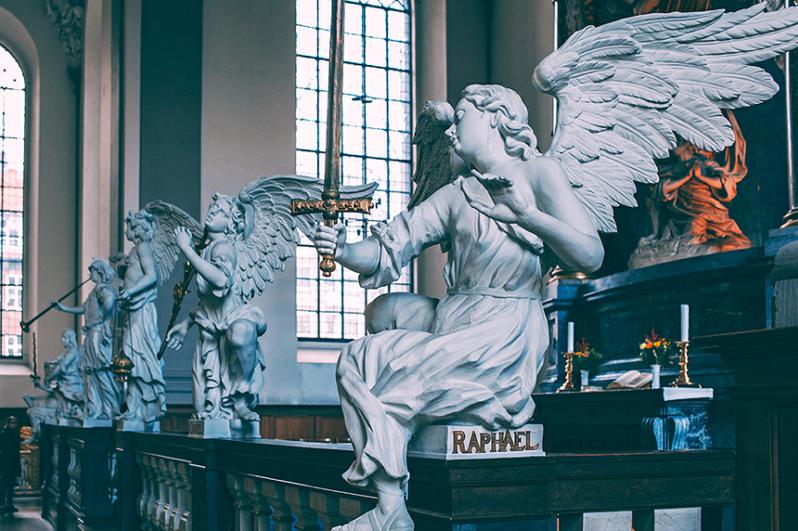Angelic myths and misconceptions
Angels have a way of capturing our imaginations. Across the ages, we have seen them depicted in art, acclaimed in poetry, and celebrated in song. Angels both intrigue and comfort us. And by "us," I mean to include the adherents of Judaism, Christianity, and Islam -- all of whom acknowledge not only the existence of angelic beings but their presence among us.
But while belief in angels is common, knowledge about angels is not. And there are all kinds of wild theories -- or heresies, if you prefer -- out there, including among Catholics. As we observe the feasts of Sts. Michael, Gabriel, and Raphael, Archangels (Sept. 29) and the Guardian Angels (Oct. 2), it's good to clear up a few common misconceptions.
-- Angels are God's creatures, just as we are. God created the angels we can't see just as he created everything we can see. They aren't lesser gods, but purely spiritual beings who, unlike us, do not have physical bodies. Each angel is unique and immortal. It's not clear when they were created, or even why. But we absolutely know who brought them into being: God.
-- There are different types of angels. Both Scripture and sacred Tradition strongly suggest that there are different kinds of angels, often divided into nine "choirs" or groups. The six-winged seraphim surround God's throne with constant praise, as do the cherubim (decidedly not chubby babies with wings). Then come thrones, dominions, virtues, powers, and principalities.
And then there are the archangels. The three we know by name seem to have particular roles. St. Michael is the commander of the angelic host or army. St. Gabriel appears with life-changing announcements connected to God's covenant or plan of salvation. St. Raphael comes to bring God's healing grace. Their names reveal who they are, but also something about God. The name Michael is a rhetorical question: Who is like the Lord? (Answer: no one.) Gabriel means "God is my strength," and Raphael, "God heals."
-- Not all angels are good. Some angels fell from grace. The beings we call demons or devils are spiritual beings who have rejected God and refuse to serve him. They are active in our world and can exercise influence in our lives if we allow them to do so. The most powerful of these fallen angels has many names: Satan (meaning "adversary"), Beelzebub (the "lord of flies"), and the Devil (which means "accuser" or "slanderer"). Various passages of Scripture explain that he was originally created as Lucifer or "light-bearer." Exercising free will, however, he chose to rebel and set up a rival kingdom of darkness. One-third of the angels followed him.
-- Everyone has a guardian angel. The existence of guardian angels is not explicit in Scripture, but the Church has recognized their implicit presence in the Bible since the 13th century. Our faith tradition, however, has been unwavering in its belief in angelic guardians. St. Basil (d. AD 379) said, "Beside each believer stands an angel as protector and shepherd leading him to life." The Catechism expounds on this further: "From infancy to death, human life is surrounded by their watchful care and intercession (CCC, 336). We are not alone on our pilgrimage to eternal life. Help is available from both angels and saints.
We do not become angels when we die. Angels and humans are distinct beings, and they remain so for eternity. Angels can't become human, and people don't turn into angels. Our bodies and souls will separate from each other when we die. Still, being human means having both a body and a soul. How can that be? Jesus' resurrection shows us God's plan. Ultimately, our physical bodies won't just disappear; they will rise and be glorified. And when we experience the fullness of salvation Jesus offers us, we will live in the place he is preparing for us.
The "angels" we see everywhere around us may bring us some delight, but real angels are sent to bring us to heaven. As we stumble along in faith, let's take comfort in knowing that someone is there to help us follow the path all the way to glory.
- Jaymie Stuart Wolfe is a Catholic convert, wife, and mother of eight. Inspired by the spirituality of St. Francis de Sales, she is an author, speaker, and musician, and provides freelance editorial services to numerous publishers and authors as the principal of One More Basket. Find Jaymie on Facebook or follow her on Twitter @YouFeedThem.



















